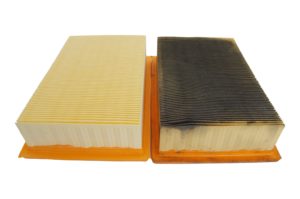 For most vehicles. Changing these components when needed can save hundreds of dollars per year and maximize gas mileage.
For most vehicles. Changing these components when needed can save hundreds of dollars per year and maximize gas mileage.
What does the Air Filter and PCV (Positive Crankcase Ventilation) Valve actually do?
Having your Air Filter replaced at normal maintenance intervals allows for greater fuel efficiency and reduces the amount of particles that can enter the engine, possibly shortening the engines life. Air filters help the engine breath keeping contaminates out of your engine, providing clean air to the engine increasing horsepower and acceleration while improving fuel efficiency.
Poor engine performance and increased exhaust emissions are the result of a dirty air filter or PCV valve. An improperly operating PCV system fails to remove contaminants and water vapor from the crankcase.
When filter is help up to the light and you cant see through it that’s a sign that it needs to be replaced so that harmful composites don’t get into your engine. Super-Lube recommends changing your air filter every 12 months or 15,000 miles.
Note: If you drive in dusty or other extreme conditions, it may be necessary for these components to be changed more frequently.


